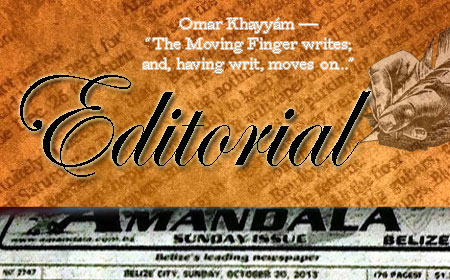Founded in 1873, the Politecnica early evolved under Spanish influence and later (1931-45) was shaped along lines of West Point by U.S. officers.
– THE GUATEMALAN MILITARY AND THE ESCUELA POLITECNICA, by Franklin Patterson, 1988
We do not believe that the Republican Party nominee, Donald Trump, will be elected President of the United States in November this year, but the mere fact that a Trump presidency is even a possibility should become a kind of wake up call for Belizean Americans.
The United States of America has been a godsend for Belizeans for about a century. In the early part of the twentieth century, dark-skinned British Hondurans tried to reach New York City and Chicago, slavery having been abolished by the U.S. following their civil war of 1861-1865. British Hondurans who could pass for white mostly headed for New Orleans, which was the first American port of call once you left Belize by sailing ship in the old days.
The racist American quota system controlled the immigration into the U.S. from the black British Caribbean, and favored immigration from the Latin Central American republics. But Belize had a land bridge to the United States through Mexico, and once workingclass Belizeans reached the border between the U.S. and Mexico we could enter the United States posing as black Americans who had been partying in Mexico border cities. Constitutionally, British Honduras was black British Caribbean, but the land bridge to America through Mexico made us unique.
Contact with the American politico-economic system through Belizean workers’ travel to Panama (U.S. Canal Zone) during World War II (1939-45) increased Belizeans’ dissatisfaction with the colonial rule of the British in Belize. The nationalist uprising in British Honduras by way of the formation of the People’s United Party (PUP) in 1950 was definitely and overtly anti-British, but it was also distinctly pro-American.
In the aftermath of Hurricane Hattie in October of 1961, the United States opened its cities as refugee centers for Belizeans who had relatives already in the U.S., and a serious migration began which became even more pronounced after British Honduras became a self-governing colony in January of 1964. As the Vietnam War began to escalate in 1965, the U.S. wanted as many young soldiers as Uncle Sam could find. Young Americans, especially white ones, were evading the draft. The visa opportunities for young Belizean males,who often joined the American military, became more plentiful.
By the time the Vietnam War ended in 1975, the United States had become home for a relatively large amount of Belizeans, both documented and undocumented. Remember, those migrating to America were those in their strong, productive years. It was those who were too old and too young who remained in Belize.
There were four more decades of success and prosperity for Belizean Americans after the Vietnam War ended, and that period culminated with the unprecedented, stunning election of a black President. Today, the Trump candidacy exposes the fact that there has been a white supremacist backlash against the two Barack Obama presidential terms. It was black and Latino votes which put Barack on the top in 2008 and 2012.
The special problem Trump poses is for those Belizeans who are undocumented. Obama has not been all that kind to undocumented Belizeans: the deportation rate has been high. But the indications are that the Donald would send home many, many blacks and Latinos from the Central American and Caribbean region.
Over the years, this newspaper has quoted Robert Frost on many, many occasions, and now we say it one more time: “Home is where, when you have to go there, they have to let you in.” Recent Guatemalan aggression raises the possibility that documented Belizean Americans may lose their second home – Belize. But Trump is staying that if you are undocumented, then you have no home in the United States: your home is where you came from.
If you study the first United Democratic Party (UDP) government in Belize, elected in December of 1984, it was a very pro-American administration. That Manuel Esquivel government did everything in its power to please Uncle Sam. This was during the Ronald Reagan years of right wing rule in America, and Dr. Esquivel had no problem in toeing the Washington line.
The UDP lost power in 1989, and the second Esquivel term between 1993 and 1998 probably saw a little willingness to stand for Belize against Washington. This is, however, speculation. This is a period during which this newspaper was fighting for its life with the second Esquivel administration, and we do not have that good an idea what Dr. Esquivel was thinking with respect to his foreign policy and the mighty superpower to the north.
This UDP Prime Minister, Rt. Hon. Dean Barrow, has dared the U.S. on one specific occasion, during the Ebola scare, but insofar as his overall foreign and economic policies are concerned, Washington has to be pleased. The problem for Mr. Barrow now, however, is that his acceptance of Washington’s instructions where Guatemalan aggression is concerned is increasing the energy in the long dormant PUP camp. Since Guatemalan aggression against Belize is working well for Guatemalan President Jimmy Morales on his domestic political front lines, Guatemalan aggression is not likely to decrease any time soon. This means that opposition to Mr. Barrow’s Guatemalan policies is likely to grow at the Belizean base and contribute to greater PUP confidence.
Belizean Americans have basically accepted the Barrow/Elrington appeasement line on Guatemalan aggression, especially in New York, Chicago, and Houston, but the possibility of a Trump presidency will contribute to a greater concern amongst Belizean Americans where their second home in Belize is concerned. Belizean Americans may become more impatient with Barrow/Elrington appeasement as the Donald’s profile becomes higher and higher in the coming months. We’re just saying. We shall see.

